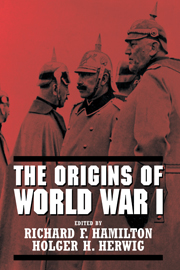Book contents
- Frontmatter
- Contents
- List of Tables and Maps
- Contributors
- Acknowledgments
- 1 World Wars: Definition and Causes
- 2 The European Wars: 1815–1914
- 3 Serbia
- 4 Austria-Hungary
- 5 Germany
- 6 Russia
- 7 France
- 8 Great Britain
- 9 Japan
- 10 The Ottoman Empire
- 11 Italy
- 12 Bulgaria, Romania, and Greece
- 13 The United States
- 14 Why Did It Happen?
- 15 On the Origins of the Catastrophe
- Appendix A Chronology, 1914
- Appendix B Dramatis Personae
- Appendix C Suggested Readings
- Index
1 - World Wars: Definition and Causes
Published online by Cambridge University Press: 05 August 2012
- Frontmatter
- Contents
- List of Tables and Maps
- Contributors
- Acknowledgments
- 1 World Wars: Definition and Causes
- 2 The European Wars: 1815–1914
- 3 Serbia
- 4 Austria-Hungary
- 5 Germany
- 6 Russia
- 7 France
- 8 Great Britain
- 9 Japan
- 10 The Ottoman Empire
- 11 Italy
- 12 Bulgaria, Romania, and Greece
- 13 The United States
- 14 Why Did It Happen?
- 15 On the Origins of the Catastrophe
- Appendix A Chronology, 1914
- Appendix B Dramatis Personae
- Appendix C Suggested Readings
- Index
Summary
It is only fair to ask: Why another book on 1914? Surely, the origins of that war have been studied, reviewed, and revised almost beyond any reader's endurance. Vladimir Dedijer, arguably the leading expert on the Sarajevo assassination, claimed that already in 1966 more than 3,000 books had been published on that subject alone. And the torrent of ink spilled on that tragic murder has never abated. Hence, why more?
The short answer is that many of us have missed several key elements in the vast literature on 1914. First, who precisely were the decision makers? Monarchs, presidents, foreign ministers, staff chiefs, or a combination of these? And what were their mindsets in July 1914? How had the experiences of the recent past (and especially of the two Balkan Wars of 1912–13) shaped their outlooks? Second, how did those governments go about declaring war? In other words, was there a constitutional definition of war powers? Were cabinet and parliamentary approval required in all cases? Or could war be declared simply by royal fiat? Third, which “social forces” or extraparliamentary lobbies had input into the decision for war? And fourth, what were the reasons? What were the justifications for the decisions to go to war? Why did those decision makers do it? Were there common or similar justifications? Or is a differentiated reading needed? In short, we sought answers to questions that had troubled us from previous readings on July 1914.
- Type
- Chapter
- Information
- The Origins of World War I , pp. 1 - 44Publisher: Cambridge University PressPrint publication year: 2003
- 2
- Cited by



